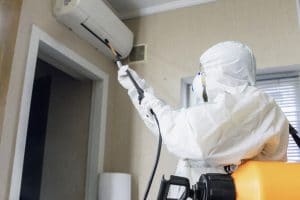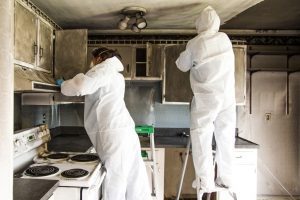Biohazard and Trauma Cleaning Scenes Should Be Approached with Professionalism and Compassion
Biohazard and trauma cleaning may be necessary in the wake of a homicide, suicide, violent crime, or accident. Due to the highly stressful and sensitive nature of the event, professional trauma scene cleaners must approach the scene with a high level of compassion and professionalism.
Specific scenarios when biohazard and trauma scene cleaning are required include crime scenes, such as those where law enforcement dispel tear gas. Emergency vehicles and facilities require cleanup by trauma scene cleaners. Areas in which suicides, accidental death, and homicides occurred require professional decontamination.
Is Biohazard Cleaning Necessary?
Biohazard cleanup is necessary when hazardous materials remain onsite. Trauma scene cleaning is also needed in the aftermath of a violent or even natural death, as bodily fluids, blood, and tissue may be left behind. Such potentially harmful contaminants must be carefully and safely removed by professionals.
Blood, tissue, and bodily fluids can harbor bloodborne pathogensPathogens are microorganisms such as bacteria, viruses, or f... More that leadLead is a heavy metal that can be toxic to humans, especiall... More to disease. After a death, blood and bodily fluids can become trapped in floorboards, walls, and ceilings. If these hazardous materials are improperly cleaned, people can become sick months or even years later.
Especially in instances of suicide, homicide, and accidental death, the families and loved ones of the victim will be in a state of emotional distress. Trauma scene cleaners must pursue the task of cleanup, despite the pain and grief experienced by those near and dear to the victim.
A fast response by professional biohazard and trauma cleaning professionals is critical in the aftermath of the death. Although the situation is sensitive and emotional, trauma scene cleanup professionals are trained to be respectful and compassionate to the family and loved ones while working onsite.
Controlling the contaminationContamination is the presence of harmful or unwanted substan... More at the scene requires a multistep approach to prevent cross-contaminationCross-contamination occurs when harmful substances, such as ... More of other areas. Cleanup begins by removing biological materials, like blood, bodily fluids, dirt, and debris. Surfaces that are unable to be cleaned will be disposed of properly.
A disinfection of the cleaned scene is performed. Testing is done onsite using adenosine triphosphate fluorescence to confirm that the premises is free of contaminants. A deodorizer is applied in the final stage of cleanup to eliminate any offensive odors.
Trauma Scene Cleaners Respect Emotions and Property
In order to carry out the abovementioned task successfully and without adding pain to the family’s tragic situation, the biohazard and trauma scene cleaners approach each scene as unique. Trauma scene cleaners confront trauma every day, but to mourning families, upsetting scenes are unfamiliar.
Professional cleaners who approach each trauma as unique are able to extend the familied and loved ones incredible compassion. By offering deep respect for the loss, trauma scene cleaners help those who are left behind to better cope with the tragedy.
Respect for the property is another way biohazard and trauma scene cleaners offer compassion. While the home where the death took place should be cleaned with expertise and speed, the cleanup professionals handle the job without misplacing items or rummaging through personal belongings.
Trauma Scene Cleaners Ensure Confidentiality During Cleanup
A crime, suicide, or accident will naturally be met with inquiries from neighbors or others who live close by. Professional biohazard and trauma scene cleaners are dedicated to respecting the privacy of the victim’s loved ones. Cleaners protect their privacy by arriving in unmarked vehicles, for example.
Although families might be approached by curious neighbors after the tragic event, the intrusions are unwelcomed by those dealing with a life-altering tragedy. However, trauma scene cleaners, while being committed to performing the task at hand, will lend an ear if families wish to vent.
Approaching a trauma scene with professionalism and compassion is critical to supporting families. Biohazard and trauma scene cleaners are experts at removing hazardous and biohazardous materials quickly, efficiently, and with the utmost compassion toward the victim’s families and loved ones.
Qualified professionals also follow the federal and state rules governing the cleanup of biohazard materialsBiohazard materials are substances that pose a risk to human... More. Federal authorities that have instituted mandates regarding cleanup include the EPA, OSHA, and CDC. States as well the county or municipality establish rules, too, which must be followed.
Professional trauma scene cleaners who are certified by governing boards, like OSHA, can dispose of biohazard materialsBiohazard materials are substances that pose a risk to human... More. Plus, qualified and trained cleanup experts are skilled in managing the dangers of the task, using personal protective equipment on the scene and abiding by cleaning protocols.
Biohazard and trauma scene cleanup specialists bring not only their expertise in the swift removal of biohazard materialsBiohazard materials are substances that pose a risk to human... More, but a wealth of compassion, expertise, and professionalism. Families and loved ones of the victim will better cope with the tragedy when they hire experts who demonstrate sensitivity.
When you are facing a tragic death and need the property to be fully cleaned, consult professional biohazard and trauma scene cleaners. These dependable crews are trained to decontaminate your property quickly, while extending the utmost empathy for your stressful situation.
Trauma scene cleaning technicians are certified to handle and correctly discard the hazardous waste materials. Once the property is cleaned and sanitized, they dispose of the biohazardous waste at a licensed facility. The entire cleanup procedures comply with all federal, state, and local guidelines.
They also work closely with law enforcement officials when a crime has been committed. Crime scene cleaners are trained to fully cooperate with police investigators. Crime scene cleaning services are often required after the scene has been investigated by law enforcement or the paramedics have arrived.












